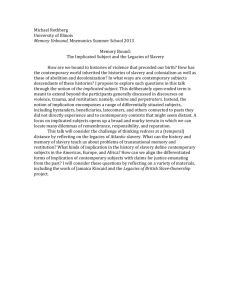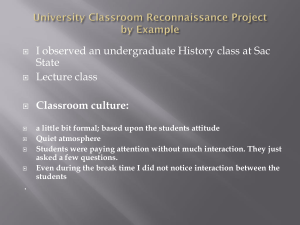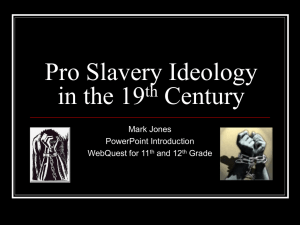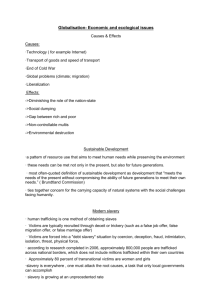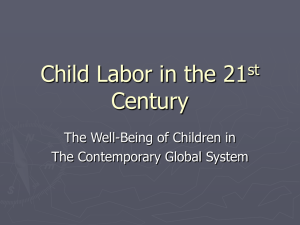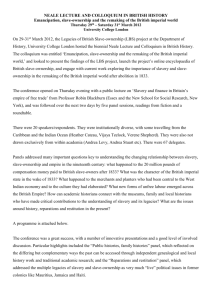Legacies of slavery in the African Diaspora: methodological
advertisement
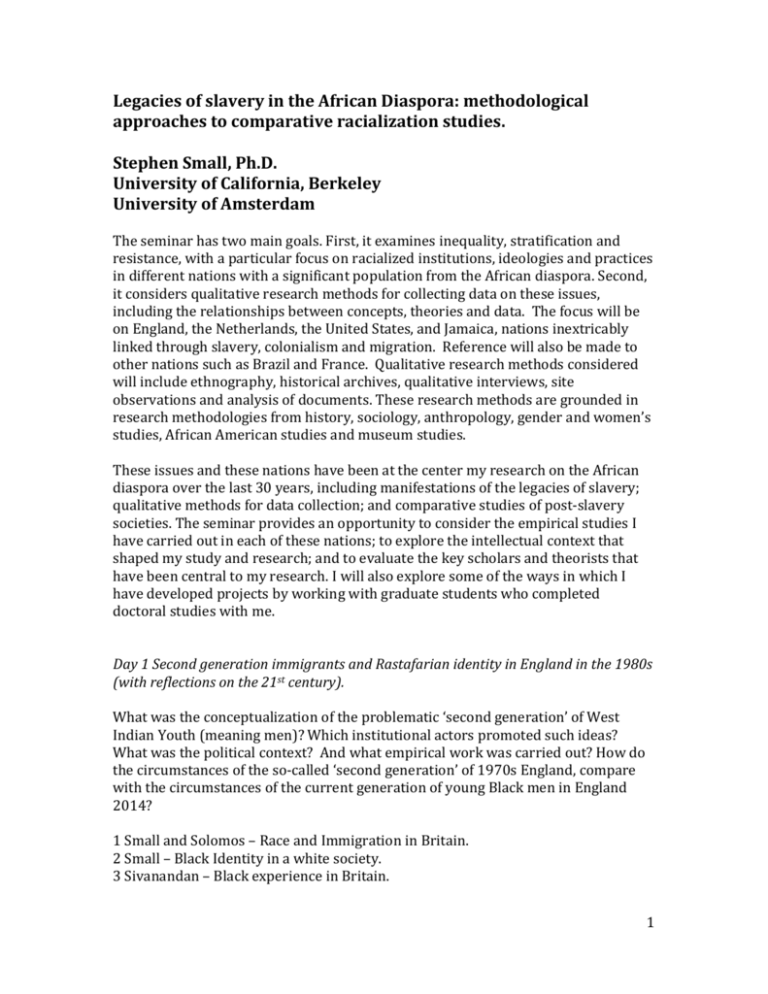
Legacies of slavery in the African Diaspora: methodological approaches to comparative racialization studies. Stephen Small, Ph.D. University of California, Berkeley University of Amsterdam The seminar has two main goals. First, it examines inequality, stratification and resistance, with a particular focus on racialized institutions, ideologies and practices in different nations with a significant population from the African diaspora. Second, it considers qualitative research methods for collecting data on these issues, including the relationships between concepts, theories and data. The focus will be on England, the Netherlands, the United States, and Jamaica, nations inextricably linked through slavery, colonialism and migration. Reference will also be made to other nations such as Brazil and France. Qualitative research methods considered will include ethnography, historical archives, qualitative interviews, site observations and analysis of documents. These research methods are grounded in research methodologies from history, sociology, anthropology, gender and women’s studies, African American studies and museum studies. These issues and these nations have been at the center my research on the African diaspora over the last 30 years, including manifestations of the legacies of slavery; qualitative methods for data collection; and comparative studies of post-slavery societies. The seminar provides an opportunity to consider the empirical studies I have carried out in each of these nations; to explore the intellectual context that shaped my study and research; and to evaluate the key scholars and theorists that have been central to my research. I will also explore some of the ways in which I have developed projects by working with graduate students who completed doctoral studies with me. Day 1 Second generation immigrants and Rastafarian identity in England in the 1980s (with reflections on the 21st century). What was the conceptualization of the problematic ‘second generation’ of West Indian Youth (meaning men)? Which institutional actors promoted such ideas? What was the political context? And what empirical work was carried out? How do the circumstances of the so-called ‘second generation’ of 1970s England, compare with the circumstances of the current generation of young Black men in England 2014? 1 Small and Solomos – Race and Immigration in Britain. 2 Small – Black Identity in a white society. 3 Sivanandan – Black experience in Britain. 1 Day 2 Racism and Class stratification of Black people under Reagan’s United States and Thatcher’s Britain. How do racist ideologies in England in the 1980s compare with racist ideologies in the United States in the 1980s? What is the relationship between biology and culture in notions of racism? Is there a ‘new racism”? And are the similarities or the differences between the two nations more important for analytical understanding? 1 Solomos – Race and Racism, Chapter 8. 2 Stephen Small – Race, Class Relations and the State in US and England. Day 3 People of mixed racial origins under 19th century slavery in the British Caribbean and the United State. What was the status of people of mixed racial descent as compared with people of exclusive Black origins under slavery? Were their major differences across each region? How did gender frame the status of people of mixed origins? What are the sources of evidence for collecting data on these issues? Small - Racial Group Boundaries and Identities: People of `Mixed-Race' in Slavery across the Americas. Small - Researching ‘Mixed-Race’ Experience Under Slavery. Concepts, Methods and Data. Day 4. Plantation Museum sites and public histories of slavery in the United States today. What is the plantation museum infrastructure across the United States today? What are the major representations of slavery in these museums? How do gender ideologies shape these representations? And how are such representations contested? 1 Eichsted and Small – Symbolic Annihilation. 2 Small – 21st Century Slave Cabins in Louisiana. 3 Small - Still Back of the Big House. 4 Small – Mixed Methods in Museum Research Day 5. Collective memory, social mobilization and political containment of slavery legacies in England and the Netherlands. 2 What the main public arenas in which systematic discussion of slavery and its legacies occurs at the present time? Who the main groups mobilizing around the memory of slavery? What is the main political preoccupation with slavery memory? And what insights do these patterns provide into knowledge production and knowledge dissemination in a context of asymmetrical power relations? 1Marika Sherwood – The Past in the Present. 2 Kwame Nimako - The Dutch Atlantic. 3Small and Nimako - Collective Memory of Slavery England and Netherlands. 3


